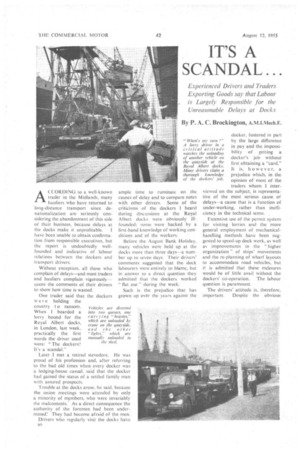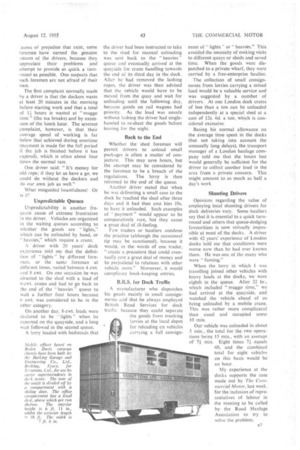IT'S A
Page 40

Page 41

If you've noticed an error in this article please click here to report it so we can fix it.
SCANDAL I..
Experienced Drivers and Traders Exporting Goods say that Labour is Largely Responsible for the Unreasonable Delays at Docks
By P. A. C. Brockington, A.M.I.Mech.E.
CCORDI NG to a well-known trader in the Midlands, many hauliers who have returned to long-distance transport since denationalization are seriously considering the abandonment of this side of their business, because delays at the docks make it unprofitable. I have been unable to obtain confirmation from responsible executives, but the report is undoubtedly wellfounded and indicative of labour relations between the dockers and transport drivers.
Without exception. all those who complain of delays—and most traders and hauliers complain vigorously— quote the comments of their drivers to show how Lime is wasted, One trader said that the dockers were holding the country t o ransom.
When I boarded a lorry bound for the Royal Albert docks,
in London, last week, practically the first words the driver used were: "The dockers? It's a scandal."
stevedore. He was proud of his profession and, after referring to the bad old times when every docker was a lodging-house casual, said that the docker had gained the status of a settled family man with assured prospects.
Trouble at the docks arose, he said, because the union meetings were attended by only a minority of mymbers, who were invariably the malcontents. As a direct consequence the authority of the foremen had been undermined! They had become afraid. of the men.
Drivers who regularly visit the docks have 136 Later I met a retired ample time to ruminate on the causes of delay and to compare notes with other drivers. Some of the criticisms of the dockers I heard during discussions at the Royal Albert docks were obviously illfounded; some were hacked by a first-hand knowledge of working conditions and of the workers.
Before the August Bank Holiday, many vehicles were held up at the docks more than three days—a number up to seven days. Their drivers' comments suggested that the dock labourers were entirely to blame, but in answer to a direct question they admitted that the dockers worked "flat out" during the week.
Such is the prejudice that has grown up over the years against the docker, fostered in part by the large difference in pay and the impossi
lility getting a docker's job without first obtaining a "card." It is, however, a prejudice which, in the opinionof most of the traders whom I interviewed on the subject, is representative of the most serious cause of delays—a cause that is a function of under-working, rather than inefficiency in the technical sense. .
Extensive use of the perm it. system for visiting lorries and the more general employment of mechanicalhandling methods have been suggested to speed-up dock work, as well as improvements in the " higher organization of ships' movements and the re-planning of wharf layouts to accommodate road vehicles, but it is admitted that these measures would he of little avail without the dockers' co-operation. The labour question is paramount.
The drivers' attitude is, therefore, important. Despite the obvious
,:auses of prejudice that exist, some roremen have earned the genuine asteem of the drivers, because they appreciate their problems and attempt to provide as quick a turnround as possible. One suspects that such foremen are not afraid of their inen.
The first complaint normally made hy a driver is that the dockers waste at least 20 minutes in the morning before starting work and that a total of 11 hours is wasted at " muggo time ".(the tea breaks) and by extension of the lunch hour. The severest complaint, however, is that their average speed of working is far below that achieved during overtime (payment is made for the full period if the job is finished before it has expired), which is often about four time.s the normal rate.
One driver said: " It's money for old rope; if they let us have a go, we could do without the dockers and do our own job as well:" What misguided boastfulness! Or is it?
Unpredictable Queues Unpredictability is another frequent cause of extreme frustration in the driver. Vehicles are organized in the waiting queues according to whether the goods are " lights," which can be unloaded by hand, or " heavies," which require a crane.
A driver with 20 years' dock experience told me that the definition of " lights" by different foremen, or the same foreman at different times, varied between 4 cwt. and S cwt. On one occasion he was directed to the shed with a load of 6-cwt. crates and had to go back to the end of the " heavies " queue to wait a further four hours because cwt. was considered to be in the other category.
On another day, 8-cwt. loads were declared to be 'lights" when he reported on the quayside, and a long wait followed in the second queue.
A lorry loaded with bedsteads that the driver had been instructed to take to the shed for manual unloading was sent back to . the " heavies " queue and eventually arrived at the quayside for crane handling towards the end of its third day in the dock. After he had removed the lashing ropes, the driver was then advised that the vehicle would have to be moved from the quay and wait for unloading until the following day, because goods on rail wagons had priority. As the load was unsafe without lashing the driver had singlehanded to re-sheet the goods before leaving for the night.
Back to the End Whether the shed. foreman will permit drivers to unload small packages is often a matter of conjecture. This may save hours, but the attempt may be considered by the foreman to be a breach of the regulations. The lorry is then returned to the end of the queue.
Another driver stated that when he was delivering a small case to the dock he reached the shed after three days and it had then cost him 10s. to have it unloaded. Such examples of payment." would appear to be comparatively rare, but they cause a great deal of ill-feeling.
Few traders or hauliers condone the practice (although the occasional tip may be sanctioned), because it would, in the words of one trader, "create a precedent that could eventually cost a great deal of money and be prejudicial to relations with other vehicle users." Moreover, it would complicate book-keeping entries.
B.R.S. for Dock Traffic A manufacturer who dispatches his goods mainly in small consignments said that he always employed British Road Services for dock traffic. because they could separate the goods from trunking lorries at the local depot for reloading on vehicles carrying a full consign
ment of " lights" or "heavies." This avoided the necessity of making visits to different quays or sheds and saved time. When the goods were dispatched to a private wharf, they were carried by a free-enterprise haulier.
The collection of small consignments from lorries carrying a mixed load would be a valuable service and was suggested by a number of drivers. At one London dock crates of less than a ton can be unloaded independently at a special shed at a cost of 12s. 6d. a ton, which is considered excessive.
Basing his normal allowance on the average time spent in the docks (but not taking into account the unusually long delays), the transport manager of a London haulage company told me that the hours lost would generally be sufficient for the driver to collect another load in the area from a private concern. This might amount to as much as half a day's work.
Shunting Drivers Opinions regarding the value of employing local shunting drivers for dock deliveries vary. Some hauliers say that it is essential to a quick turnround and others that queue-dodging favouritism is now virtually impossible at most of the docks. A driver with 42 years' experience of London docks told me that conditions were worse now than he had ever known them. He was one of the many who were "fuming."
When the lorry in which I was travelling joined other vehicles with heavy loads at the docks, we were eighth in the queue. After 2;"1 hr., which included '" muggo time," we had arrived at the quayside, and watched the vehicle ahead of us being unloaded by a mobile crane. This was rather more complicated than usual and occupied some 10 min.
Our vehicle was unloaded in about 5 min., the total for the two operations being 15 min., with an average of 7?,-, min. Eight times 71 equals 60, and the combined total for eight vehicles on this basis would be an hour.
My experience at the docks supports the case made out by Tire Commercial Motor, last week, for the inclusion of representatives of labour in the meeting to be called by the Road Haulage Association to try to solve the problem.




























































































